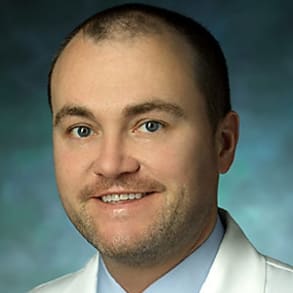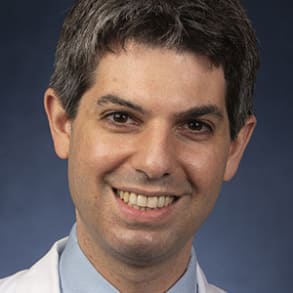Surgical oncologist Christopher Shubert and medical oncologist Mark Yarchoan discuss the latest research advancements and treatment options for liver and biliary cancer patients within the Johns Hopkins Liver and Biliary Multidisciplinary Clinic.
Mhm. Yeah. Mhm. Okay. I got into treating a petty cellular carcinoma at a time when treatment options were extremely limited. From 2007 until 2017. Actually, we only had one drug approved for the treatment of happen of cellular carcinoma. And the benefit of that drug for most patients was quite limited. But since 2017 we've actually had nine drugs approved for the treatment of hip at a cellular carcinoma. And our patients are living longer than ever before. Mhm, mm hmm. Similar to with the paris cellular carcinoma, there's just been an exponential number of treatment options for our patients with biliary tract cancers. Um It used to be that we treated these cancers with sort of a one size fits all approach. But actually in the last few years we have really developed a number of targeted therapies that can be used for certain specific subtypes of gland carcinomas. So all of the patients who come into our clinic receive molecular profiling of their kalandia carcinoma. And this often allows us to personalize their treatment recommendations. Yeah. So here at johns Hopkins in the liver and biliary multidisciplinary clinic. We truly have a full spectrum of surgical and procedural offerings, including laparoscopic and robotic have protected me including major habitat to me as well as more advanced procedures such as alPS insight to cold profusion, vascular reception and reconstructions as well as combined procedures with other specialties. Yeah, yeah. In recent years, liver and biliary surgery has dramatically changed in the sense that but the promotion of surgical safety in years prior and now combined with are more modern chemotherapeutic from our colleagues and medical oncology. Our surgeries have expanded to include not only a greater magnitude in terms of what we do surgically, but also a greater proportion of patients who were maybe once not candidates for surgery but now can become candidates due to more effective therapies. Right. The main focus of my clinical research involves developing new forms of immune therapy for liver cancer. Um immune therapies are designed to help the body's own immune system recognize cancer and attack cancer. Some of our trials are testing new forms of immunotherapy for patients who have more advanced stages of liver cancer and may need new options. But we're also interested in taking immune therapies that have shown activity for liver cancer and moving them into earlier stages of cancer not only to prolong life, but hopefully to improve the chance of cure for respectable patients. Yeah, I would say the patients that I see often are 2nd and 3rd opinion consults, many of whom have been said to be under assessable at other centres, including other national leading centers. I would say many patients come that may be a failed first line therapies and for the vast majority of those patients, I think we are able to offer either an effective surgical option, meaning a margin negative resection and good peri operative outcomes or second line effective chemotherapeutic. Mm. Yeah. Mm.




